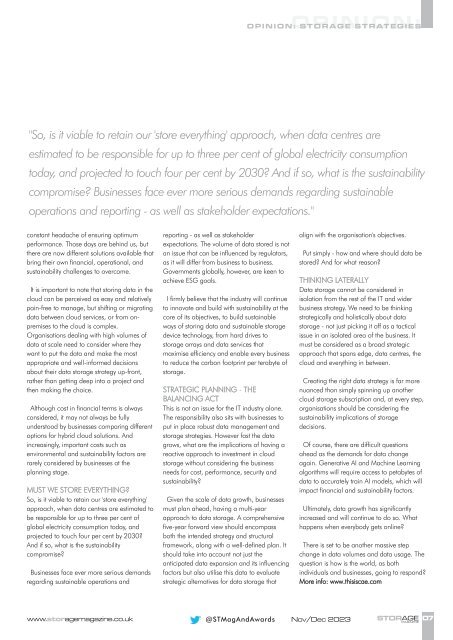ST Nov-Dec 2023
Create successful ePaper yourself
Turn your PDF publications into a flip-book with our unique Google optimized e-Paper software.
CAE 6.qxd 01-<strong>Dec</strong>-23 10:53 AM Page 3<br />
OPINION:<br />
OPINION: <strong>ST</strong>ORAGE <strong>ST</strong>RATEGIES<br />
"So, is it viable to retain our 'store everything' approach, when data centres are<br />
estimated to be responsible for up to three per cent of global electricity consumption<br />
today, and projected to touch four per cent by 2030? And if so, what is the sustainability<br />
compromise? Businesses face ever more serious demands regarding sustainable<br />
operations and reporting - as well as stakeholder expectations."<br />
constant headache of ensuring optimum<br />
performance. Those days are behind us, but<br />
there are now different solutions available that<br />
bring their own financial, operational, and<br />
sustainability challenges to overcome.<br />
It is important to note that storing data in the<br />
cloud can be perceived as easy and relatively<br />
pain-free to manage, but shifting or migrating<br />
data between cloud services, or from onpremises<br />
to the cloud is complex.<br />
Organisations dealing with high volumes of<br />
data at scale need to consider where they<br />
want to put the data and make the most<br />
appropriate and well-informed decisions<br />
about their data storage strategy up-front,<br />
rather than getting deep into a project and<br />
then making the choice.<br />
Although cost in financial terms is always<br />
considered, it may not always be fully<br />
understood by businesses comparing different<br />
options for hybrid cloud solutions. And<br />
increasingly, important costs such as<br />
environmental and sustainability factors are<br />
rarely considered by businesses at the<br />
planning stage.<br />
MU<strong>ST</strong> WE <strong>ST</strong>ORE EVERYTHING?<br />
So, is it viable to retain our 'store everything'<br />
approach, when data centres are estimated to<br />
be responsible for up to three per cent of<br />
global electricity consumption today, and<br />
projected to touch four per cent by 2030?<br />
And if so, what is the sustainability<br />
compromise?<br />
Businesses face ever more serious demands<br />
regarding sustainable operations and<br />
reporting - as well as stakeholder<br />
expectations. The volume of data stored is not<br />
an issue that can be influenced by regulators,<br />
as it will differ from business to business.<br />
Governments globally, however, are keen to<br />
achieve ESG goals.<br />
I firmly believe that the industry will continue<br />
to innovate and build with sustainability at the<br />
core of its objectives, to build sustainable<br />
ways of storing data and sustainable storage<br />
device technology, from hard drives to<br />
storage arrays and data services that<br />
maximise efficiency and enable every business<br />
to reduce the carbon footprint per terabyte of<br />
storage.<br />
<strong>ST</strong>RATEGIC PLANNING - THE<br />
BALANCING ACT<br />
This is not an issue for the IT industry alone.<br />
The responsibility also sits with businesses to<br />
put in place robust data management and<br />
storage strategies. However fast the data<br />
grows, what are the implications of having a<br />
reactive approach to investment in cloud<br />
storage without considering the business<br />
needs for cost, performance, security and<br />
sustainability?<br />
Given the scale of data growth, businesses<br />
must plan ahead, having a multi-year<br />
approach to data storage. A comprehensive<br />
five-year forward view should encompass<br />
both the intended strategy and structural<br />
framework, along with a well-defined plan. It<br />
should take into account not just the<br />
anticipated data expansion and its influencing<br />
factors but also utilise this data to evaluate<br />
strategic alternatives for data storage that<br />
align with the organisation's objectives.<br />
Put simply - how and where should data be<br />
stored? And for what reason?<br />
THINKING LATERALLY<br />
Data storage cannot be considered in<br />
isolation from the rest of the IT and wider<br />
business strategy. We need to be thinking<br />
strategically and holistically about data<br />
storage - not just picking it off as a tactical<br />
issue in an isolated area of the business. It<br />
must be considered as a broad strategic<br />
approach that spans edge, data centres, the<br />
cloud and everything in between.<br />
Creating the right data strategy is far more<br />
nuanced than simply spinning up another<br />
cloud storage subscription and, at every step,<br />
organisations should be considering the<br />
sustainability implications of storage<br />
decisions.<br />
Of course, there are difficult questions<br />
ahead as the demands for data change<br />
again. Generative AI and Machine Learning<br />
algorithms will require access to petabytes of<br />
data to accurately train AI models, which will<br />
impact financial and sustainability factors.<br />
Ultimately, data growth has significantly<br />
increased and will continue to do so. What<br />
happens when everybody gets online?<br />
There is set to be another massive step<br />
change in data volumes and data usage. The<br />
question is how is the world, as both<br />
individuals and businesses, going to respond?<br />
More info: www.thisiscae.com<br />
www.storagemagazine.co.uk<br />
@<strong>ST</strong>MagAndAwards <strong>Nov</strong>/<strong>Dec</strong> <strong>2023</strong><br />
<strong>ST</strong>ORAGE<br />
MAGAZINE<br />
07

















